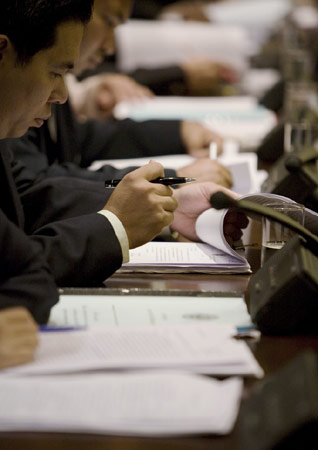Business Culture: Business Meetings
Businesspeople in Thailand are predominantly Chinese, with strong connections to their family businesses in China. Therefore, it is sometimes necessary to seal a deal both in Thailand and in China. Younger Thai businesspeople tend to be open-minded and experienced in international trade and business.
Thai businesspeople will never directly disagree with you. Instead, should disagreement arise, they will either ask circular questions, or give noncommittal answers. It is imperative to ask indirect questions to try and glean what about your proposal has caused them hesitation. It may be well worth it to hire an interpreter who can handle these kinds of delicate interactions.
Even though Thailand is a male-dominated society, foreign businesswomen are made welcome as long as they behave in a conservative, subdued fashion.
Preparation
Thais tend to take considerable time to build trust and to establish the basis for a loyal business partnership. Arranging for an introduction by a well-established, local contact is highly recommended. Thais conduct business only with people they know and respect. Plan for initial meetings to be of a predominantly social nature. Subsequent meetings will be more business-focused.
Since business relationships are formed between individuals and not necessarily between firms, it is important to keep your negotiating team intact. If replacements must be made mid-deal, the relationship-building process will have to begin anew or may even grind to a halt.
Thai is the official language, and although many Thai businesspeople (especially in Bangkok) speak at least some English, it is worthwhile checking if an interpreter should be engaged for the meeting.
Whether you are interested in imports or exports, it is imperative to open an account in a Thai bank.
Thais are typically reluctant to express criticism or even constructive feedback in a direct fashion, and are easily offended if you do so. This is another reason why it is advisable to have a third-party contact, who can convey these messages.
| English | Thai |
|---|---|
| Hello / Goodbye (male speaker) | Sawatdee krap |
| Hello / Goodbye (female speaker) | Sawatdee kha |
| Please (male speaker) | Add N’krap to a question or statement to make it more polite |
| Please (female speaker) | Add N’kha to a question or statement to make it more polite |
| Thank you (male speaker) | Kawpkhun krap |
| Thank you (female speaker) | Kawpkhun kha |
| You’re welcome | Yindee |
Scheduling
In Thailand, relationship building, negotiations, and decision making are often slow and protracted processes. Be prepared to make several trips in order to finalize your deal.
Cold calling may work with Thai companies, especially if you are calling from abroad at the recommendation of an influential person (such as a bank president). Follow up the call with a fact sheet about your company when scheduling your trip.
Schedule meetings a few days in advance, and call to confirm on the day of the meeting. Provide information regarding each of your team members, indicating their titles, positions, and responsibilities. Aim to be punctual (arriving 10 to 15 minutes late is acceptable), and when commuting within Bangkok, take into account the perpetually heavy traffic. Call ahead if you expect to be delayed. Expect your Thai counterparts to arrive late to meetings, but never express anger about this.
Work hours are usually 8a.m. to 5p.m., and lunch breaks are usually taken at noon for an hour. Dinners are usually scheduled between 6 and 8p.m.
There are many public holidays in Thailand in accordance with Thai, Chinese, and Western cultures. The longest holiday is taken in April to celebrate Songkran, the Thai New Year, so it is advisable not to book business trips during this month.
Business Attire
Despite the heat in Thailand, suits in dark colors are standard business attire, with long-sleeved shirts and ties. Outside of Bangkok, it is considered acceptable to wear open-necked shirts.
Women are expected to dress in a conservative fashion. Blouses should cover shoulders, and skirts should reach below the knee. Stockings or pantyhose are not expected. Office buildings are often air-conditioned to icy temperatures, so come prepared with a jacket or shawl.
Always remove your shoes before entering someone’s home.
Meeting Protocol
Entering the Meeting Room: Hierarchy
Allow older people to enter the room first. Similarly, always greet and introduce them first before turning to the other people in the room.
Introductions
Shake hands with all participants at a meeting upon arrival. Note that Thais reserve handshakes for foreigners: their local greeting (the wai) consists of placing palms together as if praying, elbows at waist level, and lightly touching a point between their foreheads and chests. The position of the hands relative to chest or head indicates the degree of deference—for example, a child will greet a monk with head bowed and a very high wai, while the monk will return the greeting, if at all, with a loose, chest-level wai—but as a foreigner, it’s not necessary (or possible) to observe such intricacies, and as a businessperson it’s important to be respectful without appearing obsequious. If your host greets you with a wai, you should follow his lead, at a comparable level. Senior staff do not always respond with a wai to younger and subordinate staff—instead, they may acknowledge the greeting with a nod.
Refrain from making direct eye contact. Smile and exchange business cards.
Forms of Address
Ranks are of utmost importance in Thailand as they indicate status, which then influences how formal a Thai person will be with you.
Ethnic Thai names are usually given in order of first name followed by family name. Use the pronoun Khun (Mr./Mrs./Sir/Madame—also translated as â€Åâ€Å“you"), then their first name to address them.
Chinese people in Thailand usually state their family names and then their given names. Given names often consist of two names: the generational name and the personal name. Correct pronunciation is considered courteous, so have your local contact coach you ahead of time regarding how to pronounce the names of your Thai business counterparts.
Business Cards
If possible, exchange business cards with the most senior executive present first. It is considered rude for a foreign businessperson not to offer his or her business card to all people present in a meeting. Nevertheless, Thai businesspeople do not always distribute cards.
As status and seniority are important in Thailand, always have your professional title and advanced degrees printed on your card.
Your card should be printed on high-quality stock, in English on one side and in Thai on the other. Present your card with your right hand, with the Thai side facing your counterpart. Accept a business card only with your right hand, and take a moment to study it, comment on it, and smile. Always treat business cards from Thai counterparts with respect: never write on them, stuff them into a pocket, or discard them. Place them carefully on the table in front of you or into your card case.
Body Language
Restrict your body language when in Thailand and avoid any physical contact with Thais, except for shaking their hands.
Do not make direct eye contact with your Thai counterparts. Expect them to smile frequently, even at inappropriate times, as they use smiles and laughter to mask their disapproval and embarrassment, in addition to using them at other times to express approval. They will not expect you to smile as frequently as they do; however, you should avoid frowning or shaking your head.
Thais typically stand about an arm’s length away from one another while conversing.
In Thailand, the left hand is considered unclean: try not to use it in public unless absolutely necessary.
Pointing with your index finger or your whole hand is considered rude. It is preferable to gesticulate with the whole hand or to point your chin. Do not point your feet at something or someone, and do not step over food or someone’s work. Never touch their heads or pass anything over their heads (not even a microphone cord, for instance).
Meeting Starters: Small Talk versus Getting Down to Business
It is customary in Thailand to engage in small talk before starting a business meeting, as well as at the end of the meeting, with the goal being to build trust and to establish a firm basis for a working relationship. If invited to after-hours activities, such as dinner or to play golf (a popular game among high-level Thai executives), use these opportunities to get to know one another. Thais place great emphasis on liking their business partners.
Thais appreciate when foreigners are forthcoming about their personal experiences, families, and positive impressions of Thailand. Thais frequently ask highly personal questions, such as how old you are, and they may comment that you have gained weight since the last time they saw you. These comments and questions are not intended to cause offense, and are considered perfectly polite according to Thai culture.
It is best to steer clear of topics such as the monarchy and national security. Do not complain or criticize your counterparts, or anything to do with Thailand or its culture.
Do not overly praise any possessions of your Thai counterpart, as he or she will feel embarrassed and obliged to give it to you. It is preferable to make general compliments, such as “What a lovely office you have."
Allow your Thai counterpart to initiate the transition from small talk to business.
Conducting the Meeting
Thais typically engage in a cooperative negotiation style, and strive to find win-win solutions. They are open to making concessions.
Be polite and diplomatic, and do not overtly cast blame. If your Thai counterpart has disappointed you in some way, make an indirect reference to it or else ignore it. Thais are highly sensitive to issues of honor and pride, and will make every effort to save face. They tend to be indirect in their communication and are unwilling to disagree with business partners, especially if their partners hold a superior rank to them. They are also unlikely to say an outright “no" even though this is what they mean. It is up to you to read between the lines and to understand that “maybe," “I will think about it," and “I am not sure," probably mean “no."
During the meeting, Thais typically defer to their team leader and do not express dissent or criticism. Their business teams are extremely cohesive.
Expect frequent interruptions, but these are not an expression of lack of respect or interest.
Presentation materials should include good clear visuals. It is recommended, but not vital, to have your handout materials translated into Thai. Try to avoid lengthy monologues, and summarize frequently to ensure understanding.
Decision Making
Decision making typically takes considerable time. Do not try to hurry the process along, as this will create suspicion and resentment. Thais tend to deliberate extensively and to consult many people before arriving at a decision.
If you notice that your Thai counterparts are focusing on seemingly small details, this may signal that they have misgivings or have encountered a serious problem. Do not confront them directly about the specific topic, as it is important to them that you do not lose face. Instead, listen carefully to their questions, try to piece the clues together, and if necessary use your third-party contact to investigate the matter in a non-confrontational way.
Thais tend to focus on the long-term benefits of any deal, so it is worthwhile stressing these, as well as showing a firm commitment to a long-term relationship with them. Their personal feelings are often more influential on the final decision than the facts and statistics you have presented them, although the latter can help make them feel more comfortable with taking a risky decision.
Decisions in Thailand are made by senior executives. Subordinates are typically reluctant to accept responsibility, and superiors rarely delegate their decision-making authority, so it is worthwhile identifying the senior executives and dealing with them directly whenever possible.
Note that government bureaucrats or the military, as well as criminal elements, may also have considerable influence over the final decision.
Gifts and Splitting the Bill
When giving a gift to a Thai businessperson, choose something small and relatively inexpensive, such as a book with photographs of your home country. Never give sharp objects, such as knives or scissors. Perfumes and handkerchiefs are considered too personal to give to business contacts.
Gifts are usually opened in private. It is customary at New Year’s to give particular Thai executives small gifts with your company logo, such as T-shirts, calendars, and pens. In addition, it is advisable for your company to send any partner Thai companies a basket of cookies, liquor, or other such items. It is also customary to give gifts after a contract is signed.
Since corruption and bribery are fairly common in Thailand, it may be helpful to tactfully explain your firm’s policy on gift giving, without moralizing about local customs.
Foreigners are usually entertained at restaurants, not in private homes. If, however, you are invited to someone’s home, bring small, wrapped gifts for the hosts and for the children of the household, and always leave your shoes outside. Do not take a seat before your hosts are seated, even if they urge you to do so, as this is considered a sign of bad manners. In restaurants, Thais will almost always do the ordering, and they take great pride in their cuisine. Alcohol is commonly offered at dinner, but not at lunch.
The host is expected to pay for the meal. As a foreigner hosting a meal, it is easiest to ask the restaurant to give the bill only to you at a specified time away from the table, so as to avoid an argument with your Thai counterparts over who should pay.
Follow-up
Signed contracts are not necessarily considered binding by Thai businesspeople. The best security for your business deal lies in the maintenance of your personal relationship with your Thai counterparts. Stay in touch and continue to build trust. If political or economic conditions change (or any other variables that may affect your contract), be prepared for your Thai partners to expect you to modify the terms of the agreement accordingly. Thais try to settle all disputes out of court.
Often the highest-level person at the meeting will delegate execution of the details to subordinates. Find out who the executors are, how they want to be contacted, what needs to be done, and when.
It is worthwhile sending friendly reminders regarding deadlines. Since there is a cultural inhibition against conveying bad news, you need to insist on receiving accurate reports that include any problems that may arise.
Copyright © 1993—2025 World Trade Press. All rights reserved.

 Thailand
Thailand 

